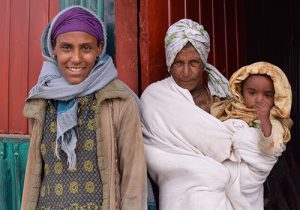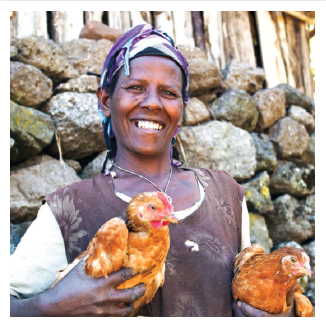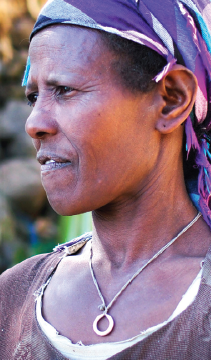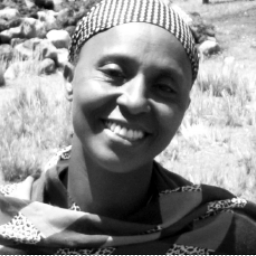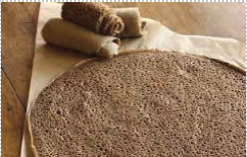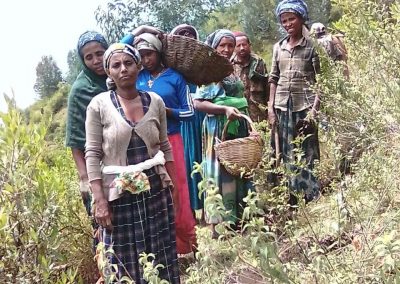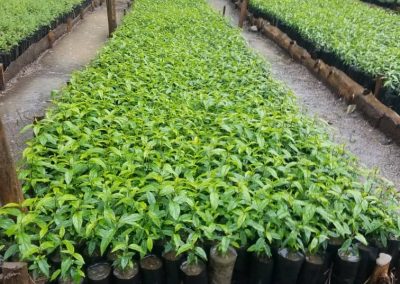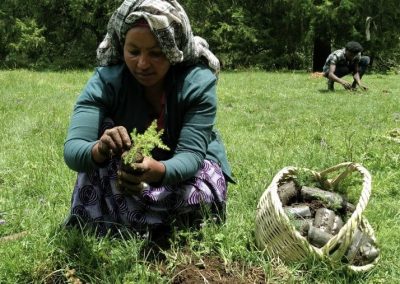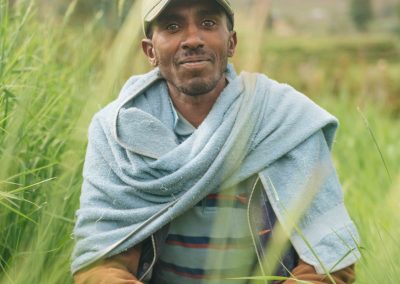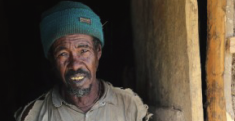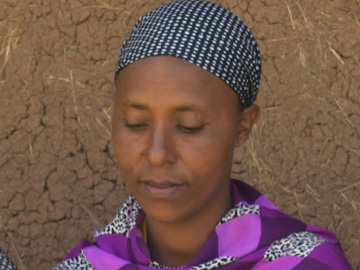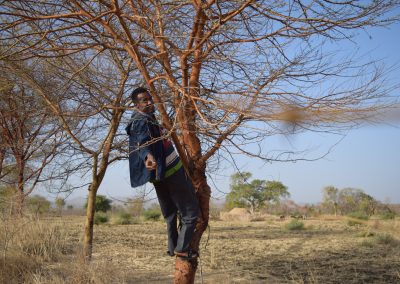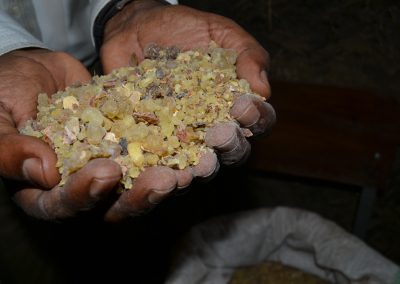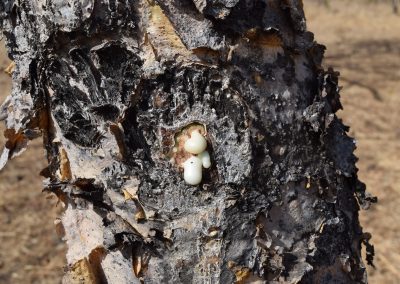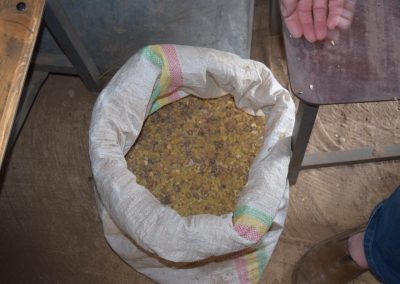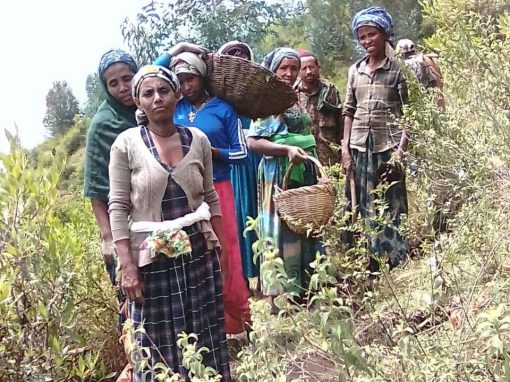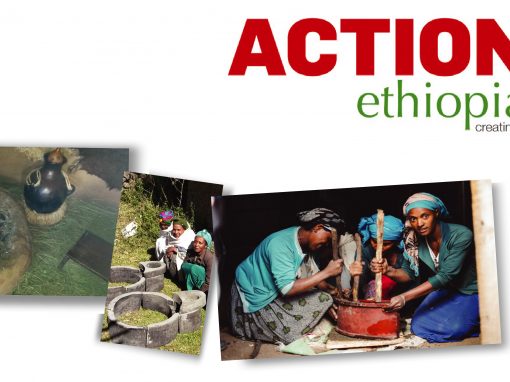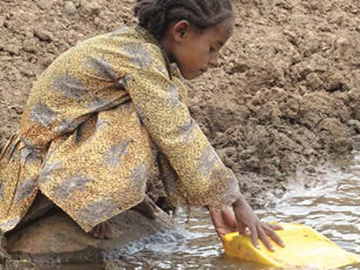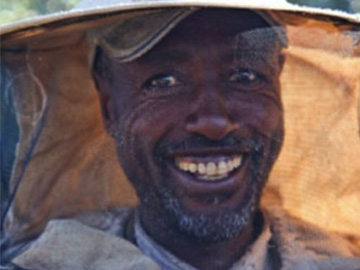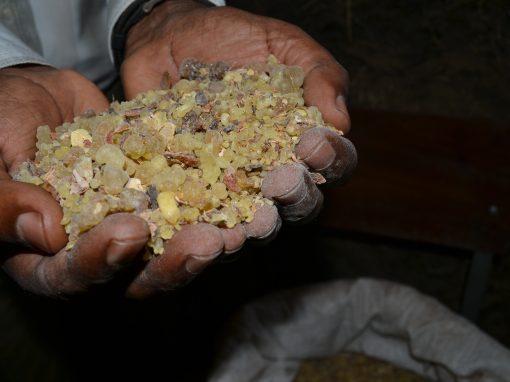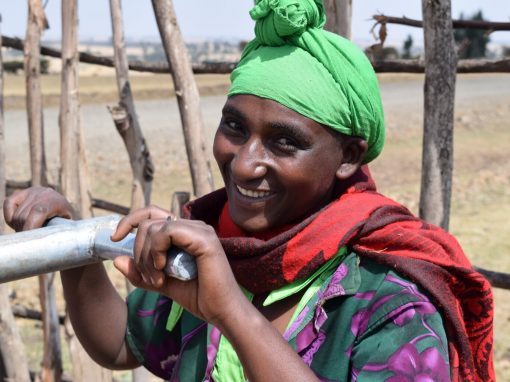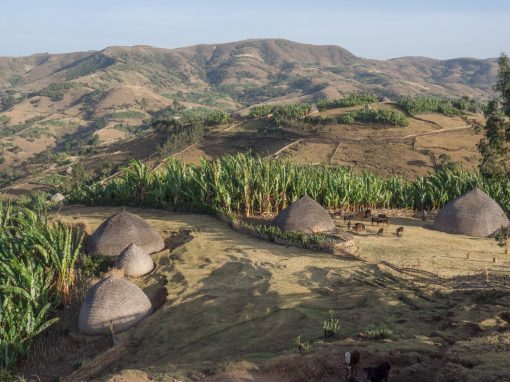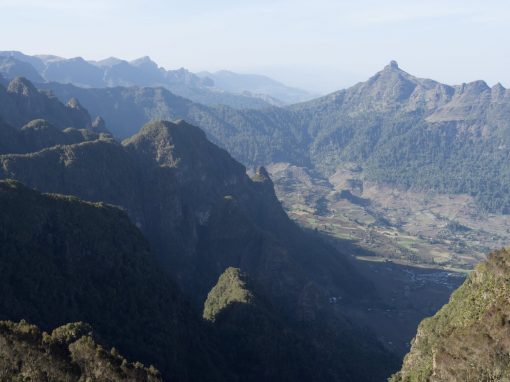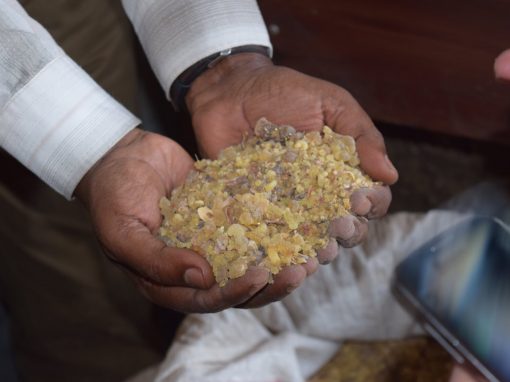Welcome to Action Ethiopia
Action Ethiopia and SUNARMA were simultaneously established in 2000 in response to the extreme challenges faced by small-scale farmers and the natural environment. We focus on three remote project areas: Wof Washa, Mettema in North West Ethiopia, helping to grow Frankincense and Arsi Negele where we work with groups planting thousands of trees.
Read more about who we are and what we do on: Action Ethiopia – About Us
From Field to Forest…
Have you ever noticed how determined a young mother can be when it involves her baby’s future? Gudasse, pictured, tells this story to Tekle Jirane, who heads up our sister organisation SUNARMA, in Ethiopia. She lives not far from Shashamane near the rift valley lakes in Ethiopia.
“My name is Gudasse Makonnen and I live in a village called Mado, a few hours’ walk from Lake Shalla in
the Rift Valley. Mado means “Over there” and referred to a once a small clearing in a forest few people knew
about. Now the forest is gone and much of our soil has been washed into the Lake, silting it up. We do not
have enough food. With the forest gone the soil does not hold moisture and it is difficult to grow anything.
I am worried about the future of my baby daughter.
What was once a damp forest became dry and degraded. Droughts grew longer, rivers dried up, and food
insecurity forced many families into desperate choices. Some even migrated far from home, sometimes to
the Middle East and beyond, where life can be very difficult.
The elders in our community acknowledge the mistakes of clearing the forest to cultivate crops, selling the
timber for building and firewood were a short term solution that led to disaster. Now we have little and the
future is uncertain. The elders told us about a tree planting program arranged by SUNARMA, the local NGO,
who would give us training and tree seedlings to plant where the forest used to be. They taught us how to
plant the saplings in big holes that would collect and hold any rain that might come. We learned how to
protect the growing seedlings and the community have organised guards to keep livestock out of the small
plantation and protect the trees.
The whole village turned out to help. I strapped my baby on my back like many of the other mothers and
we prepared and planted 5,500 trees that used to grow here in the old days. Tree like Tid (Juniper), Zigba
(Podocarpus) Weyra (African Olive) and Wanza (Cordia Aficana). These are important trees in our heritage,
Zigba means strength and Weyra means endurance and resilience.
I long for these things for my child as she grows up in this uncertain world. But I long for food from trees like
Mango or Avocado and Coffee that I am told once grew wild in the forests around Mado. Ato (Mr) Tekle if you
know people who can help us grow these trees can you tell them”.
Tekle talked with the community leaders and they have agreed to provide more land, learn as much as they can and
work with SUNARMA to try and restore their ancient forest. The community turning out in such force was impressive and Tekle Jirane and his team our experienced at working with communities to reforest lost woodland.
Will you stand with the people of Mado? If you can, a gift of £17, £27 or £33 could provide fruit tree seedlings and training, ensuring that families in Mado have both food security and the chance to stay in their village, instead of leaving in search of uncertain futures. If you could consider filling out the standing order on this page, it will help plant trees for years to come. Every tree planted is a step towards reversing climate change, restoring dignity, and keeping families together.
Thank you so much
…can change the world.
Have you ever met someone who you think can change the world? Asegedech Mamo, pictured, is one of those people, perhaps you are too?
At first glance Asegedech has been dealt a difficult hand, as a woman, in a male dominated community. She found herself widowed at forty-five with three children to support. Her husband had farmed the tiny 1.5 acre terraced plot of land, on a very steep slope on the rift valley escarpment that runs up through Ethiopia. There were times during the year when there was not enough to eat and the family went hungry. Her husband, Tesfaye, died suddenly after feeling unwell for a few days and now she is on her own. There was no way she
could take on what her husband did, growing barley and beans while she looks after her homestead and
children.
Asegedech lives in a single-room mud hut with a corrugated iron roof. There is a yard enclosed within a stone wall made from rocks, collected from the fields, with a rough lattice of branches atop, to keep out the wild animals at night. The few sheep and three heifers come into the house at night for warmth and safety, and are kept penned in their own section of the room. The whole family lives in the rest of the space with a fire in the middle of the hut to cook on and to keep the place warm. The house is just like that of her neighbours and the many little homesteads that scatter this part of the valley.
Asegedech was out early one morning collecting water from the spring, when one of her friends asked her if she had heard about the training and tree seedlings Action Ethiopia/SUNARMA was offering. An idea
immediately came into her mind!
She went to the meeting where she heard that after a day’s training, she could take 20 tree seedlings, of the fast-growing eucalyptus tree, for planting around her homestead. Action Ethiopia/SUNARMA would visit her home to give her any advice she needed. She did the training but when she came to collect her 20 tree seedlings, she asked for 2000!
her eyes and the determination of her expression that made me sure this was going to work.”
Tekle was told that the soil on her land was thin and exhausted from constant production of wheat and beans, and she knew that within four years she could start to coppice the eucalyptus and would double, treble, and then quadruple her income from the sale of wood.
Tekle encouraged her to take and plant some forage trees so her sheep and cattle would have something to eat as the eucalyptus established.
Asegedech is very determined and the only women in her community to plant trees at this scale. People are beginning to notice and want to follow her example. One tree at a time and with Asegedech’s inspiration, she can change the world.
Could you consider joining this inspirational woman helping more people like Asegedech to change the world in which they live?
A gift of £17, £21, £27 will allow more tree seedlings to be planted and training given to households on the rift valley escarpment between Debra Sina and Ankober towns.
Thank you so much for your help.
Unbreakable Strength: Empowering Women, Transforming Lives…
In the mountains of Ethiopia, two remarkable women—Hyatt Murid and Etenesh Belihu—have transformed their families’ lives through determination and ingenuity, with support from people like you.
Hyatt, a member of the Alshoni Women’s Group, started with a simple goal: to turn her skill in making Injera into a source of income. Living on less than £1 a day, Hyatt saved small amounts and secured a loan to buy Teff flour. Over six months, her business tripled, allowing her to repay her loan with interest and keep a profit. Her success shows the power of women’s groups, where small savings and community support can create lasting change.
Etenesh, a widow with five children, faced severe food insecurity. Through a similar savings group, supported by our sister organization, SUNARMA, she was lent five improved chickens and a cockerel. By selling eggs and reinvesting, Etenesh has built a path toward self-sufficiency, and her chickens are now a symbol of her independence.
Both women embody the resilience and empowerment fostered by these groups. Their success stories are a testament to the power of small savings, revolving loans, and the strength of women supporting one another.
Thank you, and I wish you a very Merry Christmas.
SCAN TO DONATE

Tree Warriors…
The Mission: Planting 445,506 Trees
The Tree warriors arrive to collect their tree seedlings from Getachew. He and his team aim to plant hundreds of thousands of trees. In the next few weeks, almost half a million will be planted in Wofwasha Forest around homesteads and to enrich the forest. Can you help spur them on, your partnership would be invaluable.
Some 4500 people from 1125 homesteads will endeavour to plant around 400 trees per family. Your help in the process would help. Thank you very much.
SCAN TO DONATE
Wonder Shrub – Hidden in Plain Sight…
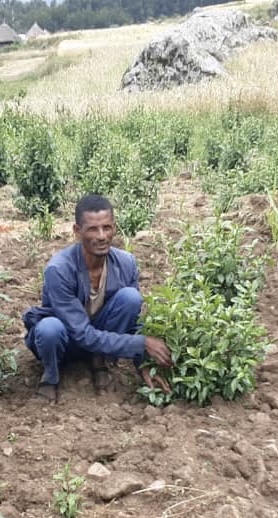
Sentayhu Belachew (48) knew that Gesho was a useful plant, his grandfather had a small shrub which he used to flavour Tej, the local honey beer. But when Sentayhu joined a small farmers group run by SUNARMA he learned it could do so much more.
This included:-
• Its roots stabilised the land helping to prevent erosion.
• The wood from the mature shrub could be used as firewood. • The ripe berry (that looks a bit like a Sloe from a Blackthorn) could be eaten if it was harvested before the birds feasted on it!
• The attractive shrub gave shade which meant he could grow other plants in between the rows receiving shelter from the elements and helping conserve soil water moisture.
• The bark has medicinal value including antimicrobial properties, alleviating inflammation, it is an anti-oxidant and even protects the liver!
All these things, along with it’s economic value added up to persuade Sentayhu to have a go at growing it. He only had just under one hectare of land to feed his family of six, it’s a big risk to set aside even a small portion of land to something new and risk hunger for his children. Anyway, he was lent 400 plants (he will pay back the value to his farmer group in two years) and grew 0.16ha of his farm and has so far made an income of£350 from the sale of 800 kilos of dried leaves. This is far beyond what he would have made on this small plot of land. Sentayhu (pictured with his Geshho plants) now plans to double his production and is learning how to grow his own plants from seed for his use and sell the excess plants in the market. Gesho is indeed a wonder plant with many uses. All these things, along with it economic value added up to persuade Sentayhu to have a go at growing it.He only had just under one hectare of land to feed his family of six, it’s a big risk to set aside even a small portion of land to something new and risk hunger for his children. Anyway, he was lent 400 plants (he will pay back the value to his farmer group in two years) and grew 0.16ha of his farm and has so far made an income of£350 from the sale of 800 kilos of dried leaves. This is far beyond what he would have made on this small plot of land. Sentayhu (pictured with his Geshho plants) now plans to double his production and is learning how to grow his own plants from seed for his use and sell the excess plants in the market.
Gesho is indeed a wonder plant with many uses.
SCAN TO DONATE

Compassion brings a community together.
“I am 75 and I am weak. We have only a small plot of land and we are rain reliant. We are in a challenging situation here, as we cannot manage on our own. We depend on the local community to help us.”
– Getene, 75.
Farmers like Getene Ashenafi and his wife Ayenech, already living in extreme poverty, have been left with a meagre supply of food due to drought. Like many million in East Africa, they have suffered from the absence of rain.
Getene says “We have only a small plot of land and we are rain reliant.”
One of the local staff from SUNARMA sensed a guest’s unease when offered food and said:
“Here, hospitality and community is our way of demonstrating love. Getene and his friends went on to explain that the community frequently meets like this to serve one another and encourage one another when facing difficult times. Their hospitality is a way of life.
Please join us in showing compassion to our GLOBAL community, by sending us a gift of whatever you can manage, so that together with SUNARMA we can continue to help Ethiopian communities like those in Zego.
Hyatt’s determination. Help her succeed.
Quiet Determination… Can you see it in her face?
Hyatt Murid is a remarkable women.
You can you see the resolve behind that look?
She’d had an idea to improve the standard of living for her family and she bubbled with excitement at the prospect of it working. But until it was her turn to speak, she sat quietly poised at a meeting with the other women, until her friends persuaded her to tell her story.
The women’s group that Hyatt was part of were as excited as she was. The small business idea had almost tripled her investment in 6 months, growing from 400 Birr to 1000 Birr (from £12 to £30). Not much you might think, but she had been living on less than 50 pence a day and she had three children!
The women’s group had got together and started saving small sums of money each month. They called themselves the Alshoni Women’s Group, which quickly attracted 85 members, each person saved 25 Birr (just under £1) each month. When they had built up 30,000 Birr of capital (£1000) they started to lend money to group members who had a good business idea.
Hyatt’s idea was simple, she was a good cook and she’d been told by friends and neighbours she cooked the best injera in the area. Injera is a pancake made from Teff flour and served with every meal.
She saved 400 Birr of her own money and borrowed 600 Birr from the Alshoni Women’s group. She could now afford to buy Teff flour and make and sell injera. She did this repeatedly over six months. She paid back the Alshoni womens group 600 birr plus 60 Birr interest. Her own capital had grown from 400 to 1000 Birr.
Working with people like Hyatt and her women’s group enables families to prosper.
Thank you so much for your generosity.
Frankincense.
Once more valuable than gold…
Mohammed Ali lives in Das Gundo village near Metema in Northwest Ethiopia in a roundhouse not unlike this one. He is 43, married with four children and supports another two adults financially. His income before he learned about Frankincense was £1,048 per year, that’s £2.88 per day
to feed and look after six people. That’s not much is it but with daytime temperatures at over 40 degrees centigrade and no rain nothing grows and livestock have little to eat, so its very tough. Out of desperation, he joined a newly formed group of people set up by our sister organisation called
SUNARMA that aimed to help the village look after the thorn forest that surrounded the settlement, protect it from outsiders and destruction by locals and learning how to methodically and expertly harvest frankincense. Mohammed couldn’t believe it; he knew about the tree and had previously even got roving workers to harvest the trees in the forest near where he grazed his cattle. It had yielded pocket money; the day labourers had damaged the trees which meant they produced practically no frankincense.
Anyway, he joined the group, which called itself the Das Participatory Forest Management Cooperative. Over several weeks Mohammed was taught how to care for the Boswellia trees. This included three years of tapping, and one year of rest for each tree, he learned how to tap with a special tool, how to harvest and how to grade and store.
SCAN TO DONATE


